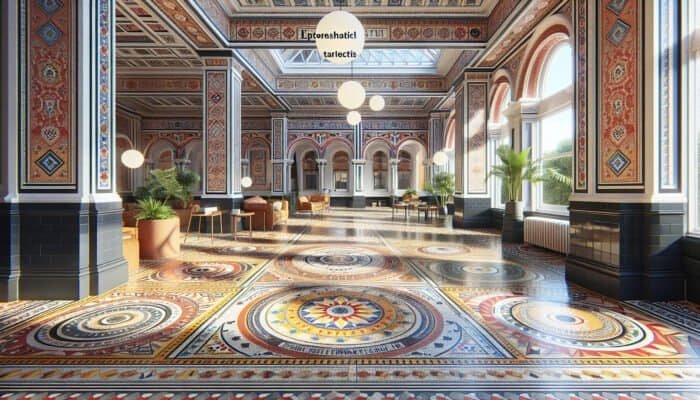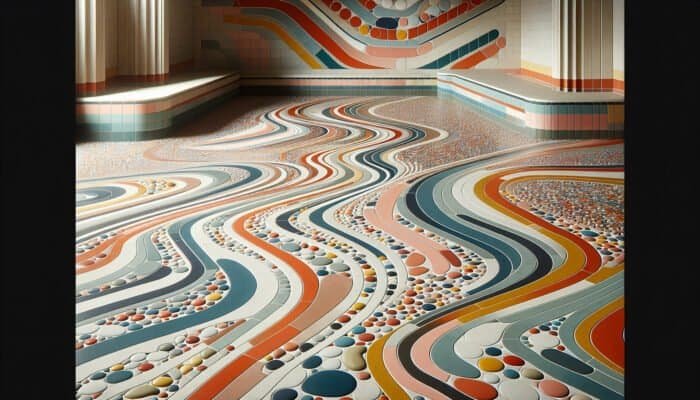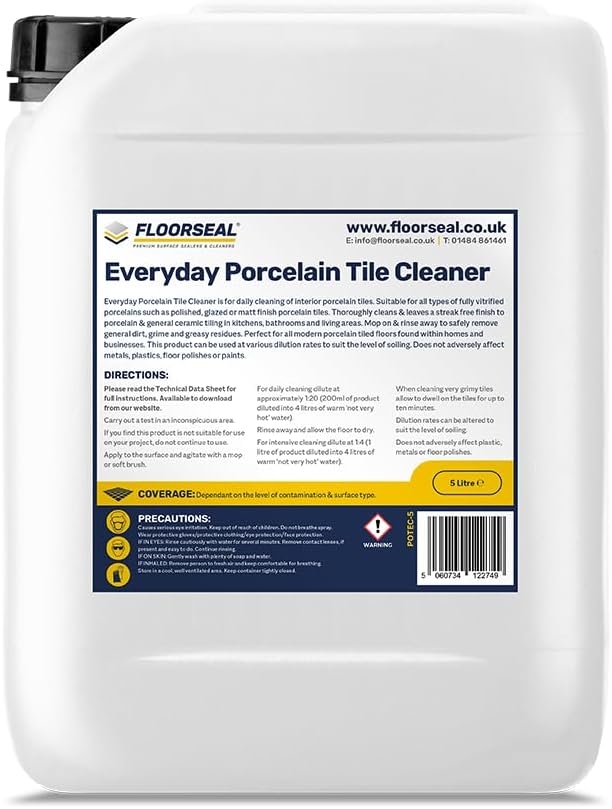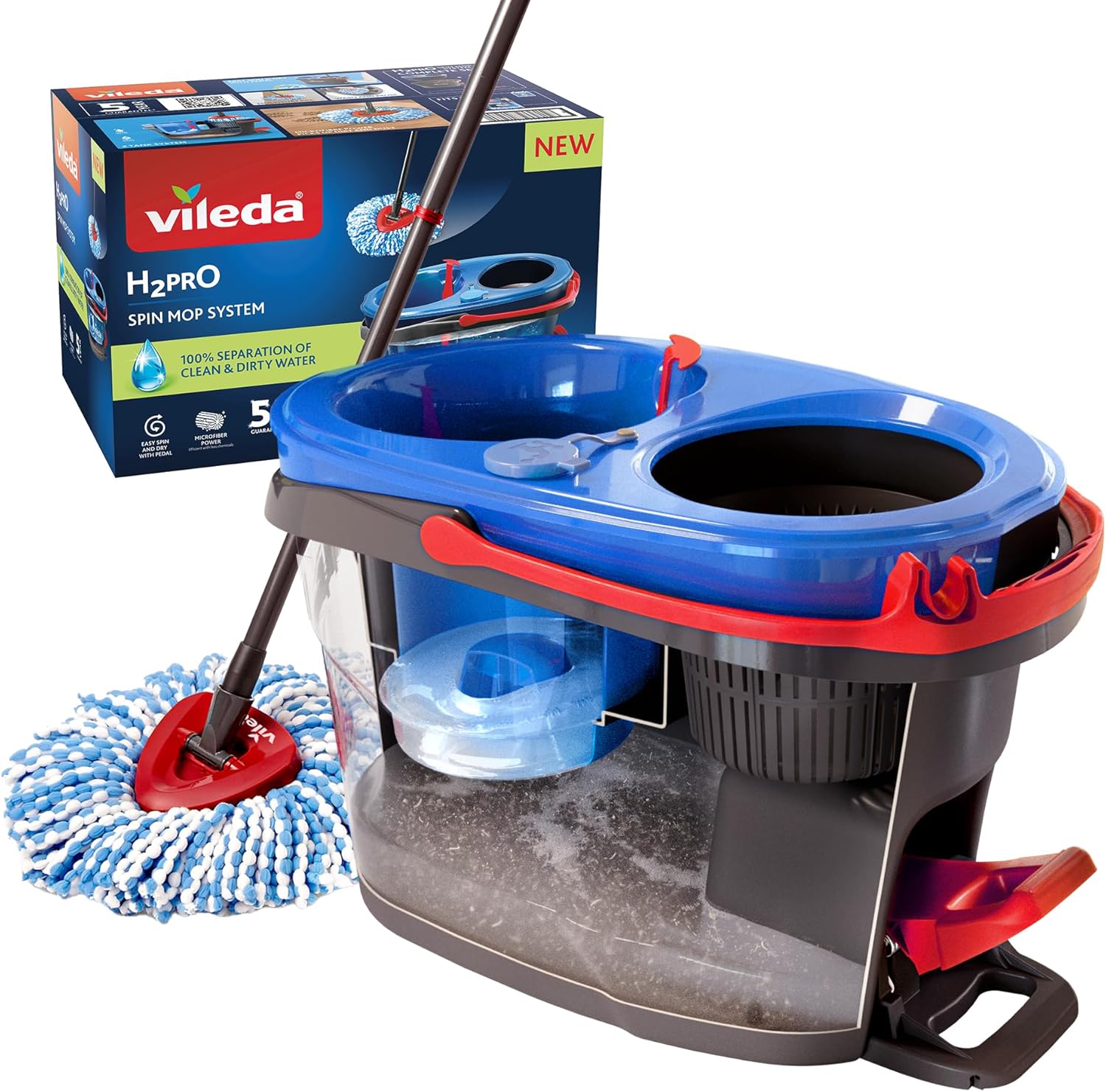Uncover the Fascinating Historical Evolution of Terrazzo in the UK
Delving into the Origins and Evolution of Terrazzo Flooring

The history of terrazzo flooring is captivating and extends back to ancient cultures, yet its narrative within the United Kingdom is particularly compelling. This beautiful flooring material originated in Italy, where talented Venetian artisans creatively reused leftover marble chips, resulting in this exquisite surface. During the Victorian era, it found its way to the UK and gained immense acclaim, driven by the Industrial Revolution and advancements in both transportation and construction methods. These innovations enabled the widespread adoption of this elegant flooring, capturing the interest of numerous architects and builders. The adaptability of terrazzo allowed it to be used in numerous public and private structures throughout the country, showcasing its timeless allure and versatility.
As the 20th century progressed, terrazzo flooring in the UK underwent a significant transformation, aligning itself with contemporary design trends and aesthetic preferences. Modern architects began to experiment with an extensive range of colours, patterns, and materials, leading to unique installations that reflect both historical relevance and modern influences. Nowadays, terrazzo is not merely a flooring option; it has become a striking statement piece that elevates the visual appeal of various spaces, encapsulating the rich architectural heritage of the UK.
Professional Insights: Key Products for Daily Terrazzo Maintenance
Celebrating Prominent Terrazzo Installations Across the UK
Throughout the United Kingdom, numerous iconic structures showcase the exceptional beauty and resilience of terrazzo flooring. A prime example can be found in the esteemed London Transport Museum, where the flooring not only serves a practical purpose but also presents an impressive artistic exhibition, featuring elaborate designs that narrate the rich history of London’s public transport system.
Additionally, the Royal Festival Hall, a premier venue for musical performances, features magnificent terrazzo floors that perfectly complement its mid-century modern architectural style. These distinguished installations not only enhance the atmosphere of these vital spaces but also tell stories of craftsmanship and the lasting legacy of terrazzo in British architecture.
Beyond these notable venues, several educational institutions, including universities and schools, have embraced terrazzo for its remarkable durability and aesthetic charm. These installations reflect a commitment to quality and longevity, making terrazzo an ideal choice for high-traffic environments that necessitate both functionality and visual appeal.
Implementing Terrazzo in Modern Design: Diverse Applications
In recent years, the use of terrazzo has surged in modern architecture and design across the United Kingdom. It has become increasingly popular not only as flooring but also as a material for walls, countertops, and even furniture, showcasing its incredible versatility. Designers are boldly experimenting with a wide range of colour combinations and aggregates, merging traditional marble with contemporary materials such as glass and resin, thereby offering a fresh perspective on this time-honoured technique.
The rise of sustainable building practices has profoundly influenced the contemporary applications of terrazzo. With an increasing focus on eco-friendly materials, many manufacturers now provide recycled options made from post-consumer glass and other materials, aligning seamlessly with the growing demand for sustainability in design. This shift towards environmentally responsible practices highlights the evolving nature of terrazzo in modern contexts.
Moreover, the hospitality and retail sectors have turned to terrazzo as a means to create inviting and visually captivating environments. Upscale restaurants, boutique hotels, and retail spaces are now opting for bespoke terrazzo designs that establish a distinctive identity while enhancing customer experiences, demonstrating the material’s adaptability and timeless charm.
Examining the Influence of Traditional Italian Terrazzo Techniques

The impact of traditional Italian terrazzo techniques is prominently visible in the UK, where local artisans and craftsmen have adopted and adapted these age-old methods to cater to regional preferences and tastes. The meticulous craftsmanship that defines Italian terrazzo has been embraced by UK-based terrazzo specialists, who combine time-honoured techniques with modern technology to create stunning flooring solutions.
This harmonious blend of tradition and innovation is reflected in the vibrant designs that define contemporary UK terrazzo installations. The incorporation of local aggregates and modern hues has resulted in a distinctly British interpretation of the Italian style, appealing to a diverse range of consumers, from homeowners to commercial establishments seeking unique flooring solutions.
Furthermore, Italian artisans have played a vital role in educating and training UK tilers and flooring specialists, ensuring that the skills required to create authentic terrazzo are passed down through generations. Workshops and training sessions led by Italian experts have enriched the local industry, fostering a deeper appreciation and understanding of this intricate art form.
Commitment to the Restoration and Preservation of Terrazzo Heritage
The preservation of historic terrazzo installations is a crucial endeavour undertaken by various conservation organisations across the UK. Many older buildings featuring terrazzo flooring are susceptible to neglect and deterioration, prompting the emergence of specialised restoration services dedicated to maintaining these architectural treasures.
Various initiatives focus on conserving significant installations found in public buildings, theatres, and railway stations. These efforts not only protect architectural heritage but also inform the public about the importance of terrazzo as a cherished art form. Restoration projects typically involve meticulous cleaning, repairing damaged areas, and sometimes recreating lost patterns, ensuring that the original beauty of the terrazzo is preserved for future generations to admire.
As awareness of the importance of heritage conservation grows, more organisations are collaborating to share best practices and resources for terrazzo restoration. This collective effort underscores a shared commitment to honouring the past while ensuring that future generations can appreciate these exquisite installations as integral components of their cultural legacy.
Examining Various Types of Terrazzo Materials
Investigating the Flexibility of Epoxy Terrazzo

Epoxy terrazzo has gained immense popularity throughout the UK due to its outstanding versatility and resilience. This material consists of a blend of resin and aggregates, allowing it to be poured into intricate designs and patterns, unlocking virtually limitless creative potential. Its flexibility makes it suitable for various applications, whether in sleek commercial office environments or stylish residential spaces.
The advantages of epoxy terrazzo include impressive resistance to stains, moisture, and wear, making it an optimal choice for high-traffic areas. For instance, many healthcare facilities and educational institutions are increasingly opting for epoxy terrazzo due to its hygienic properties and ease of maintenance. The seamless nature of epoxy installations also contributes to a cleaner, more modern aesthetic, appealing to current design preferences.
Furthermore, the extensive array of colours and finishes available with epoxy terrazzo allows for customisation that can reflect a brand’s identity or personal style. Designers in the UK are increasingly leveraging these features to create standout designs that capture attention and enhance the overall environment.
Appreciating the Enduring Charm of Cementitious Terrazzo
Cementitious terrazzo epitomises the traditional form of this flooring material, esteemed for its classic aesthetic and robust characteristics. This formulation combines cement with aggregates and is typically installed in thicker layers, resulting in a substantial feel underfoot. Cementitious terrazzo often evokes nostalgia, reminiscent of the elegant flooring found in historic buildings throughout the UK.
One of the primary benefits of cementitious terrazzo is its ability to achieve a polished, high-gloss finish that enhances its natural beauty. When maintained properly, cementitious terrazzo can endure for decades, making it a sound investment in both elegance and durability. Numerous heritage buildings and public spaces in the UK still feature original cementitious terrazzo floors, exemplifying the lasting appeal of this traditional material.
In addition, cementitious terrazzo is often lauded for its thermal mass, which aids in regulating indoor temperatures. As a result, many architects specify cementitious terrazzo for projects that prioritise sustainability and energy efficiency, seamlessly aligning with modern environmental considerations.
Elevating Spaces with Glass and Marble Terrazzo
Glass and marble terrazzo offers striking visual allure that enhances any space it occupies. This variant of terrazzo incorporates crushed glass and marble chips into the mix, creating a dynamic interplay of textures and colours that can be tailored to fit any design scheme. The reflective properties of glass can introduce depth and luminosity to interiors, making it a popular choice for both residential and commercial applications.
In the UK, glass and marble terrazzo is increasingly featured in luxury developments, high-end retail environments, and bespoke installations. The unique nature of this material allows designers to craft one-of-a-kind pieces that make a statement and enhance the character of the space.
Moreover, the combination of glass with traditional marble aggregates can contribute to a more sustainable approach to design. Many manufacturers are now sourcing recycled glass for terrazzo production, in line with the growing demand for eco-friendly materials in the UK market. This fusion of aesthetics and sustainability underscores the evolving nature of terrazzo design and its relevance in contemporary architecture.
Thorough Examination of the Terrazzo Installation Procedure
Essential Surface Preparation Techniques for Successful Terrazzo Installation
Preparing the surface for terrazzo installation is crucial to achieving a smooth and durable finish. The initial phase in this process involves a comprehensive assessment of the existing substrate. In the UK, surfaces can vary widely, ranging from concrete slabs to wooden floors, each necessitating specific preparation methods. A thorough inspection will help identify any necessary repairs or adjustments required before installation can begin.
Once the assessment is completed, the surface must be meticulously cleaned and levelled. This often entails the removal of any existing flooring, debris, or contaminants that could interfere with adhesion. For concrete surfaces, this may involve grinding or shot blasting to create a rough texture that promotes bonding. In situations where moisture is a concern, applying a moisture barrier can prevent future complications and ensure the longevity of the installation.
Following surface preparation, installers generally apply a bonding agent or primer to enhance adhesion. This step is critical, as a solid foundation is essential for the longevity and performance of the terrazzo. Proper surface preparation establishes the groundwork for a successful installation, emphasising the importance of skilled craftsmanship throughout the process.
The Art of Mixing and Pouring Terrazzo
The mixing and pouring of terrazzo is where artistry and technique meet. In the UK, professional installers often utilise customised mixes tailored to the specific needs of each project. For epoxy terrazzo, this involves blending the resin and hardener with selected aggregates to ensure a uniform mixture that achieves the desired colour and texture.
The pouring process demands precision and skill, as the installer must evenly spread the mixture across the prepared surface. Techniques such as the use of screeds or trowels ensure that the terrazzo is level and consistent in appearance. For larger areas, installers may deploy automated mixing and pouring equipment to achieve a seamless finish.
Once poured, the terrazzo mixture is often vibrated to eliminate air bubbles that could compromise the integrity of the finished product. This step is crucial for achieving a flawless surface that highlights the beauty of the materials used. Attention to detail during this phase lays the groundwork for the stunning visuals that terrazzo is renowned for, resulting in a durable and visually appealing floor.
Grinding and Polishing: Attaining an Impeccable Finish
Grinding and polishing are vital stages in the terrazzo installation process that ultimately determine the final appearance of the floor. After the terrazzo has cured, the surface is ground to remove imperfections and ensure a uniform thickness. In the UK, contractors typically utilise a series of diamond grinders, gradually transitioning from coarse to fine grits to achieve the desired smoothness.
During this phase, installers must exercise caution to avoid damaging the aggregates within the terrazzo. The objective is to expose the aggregate particles while creating a polished, reflective surface that enhances the beauty of the design. The grinding process can be meticulous and time-consuming, requiring skilled technicians to achieve optimal results.
Following grinding, the floor is polished using fine diamond pads or polishing compounds to bring out the shine and depth of the terrazzo. This step not only elevates the aesthetic but also prepares the surface for sealing, ensuring longevity and durability. A well-executed grinding and polishing process results in a stunning finish that accentuates the unique characteristics of the terrazzo.
The Importance of Curing and Sealing Terrazzo Floors
Curing and sealing are essential for the longevity and performance of terrazzo flooring. Once grinding and polishing are complete, the floor must be allowed to cure fully, which can take several days depending on the materials used and environmental conditions. This curing period is vital for the chemical reactions within the terrazzo to occur, ultimately solidifying the material and enhancing its durability.
Following curing, sealing the terrazzo is crucial for protecting the surface from stains, moisture, and wear. In the UK, a variety of sealers are available, ranging from penetrating sealers that allow the floor to breathe to topical sealers that provide a glossy finish. The choice of sealer often depends on the intended use of the space and the desired aesthetic outcome.
Regular maintenance of the seal is necessary to ensure the longevity of terrazzo flooring. Depending on the type of sealer used and the level of foot traffic, reapplication may be required every few years to maintain the floor’s appearance and protective qualities. Proper curing and sealing practices are integral to the success of terrazzo installations, ensuring they withstand the test of time while remaining visually appealing.
Quality Control and Inspection: Ensuring Excellence in Terrazzo Installation
Quality control and inspection are critical components of the terrazzo installation process, ensuring that the final product meets the high expectations of clients. In the UK, many professional terrazzo service providers implement rigorous quality control measures at every stage, from surface preparation to the final finish.
During the installation, regular inspections are conducted to identify any issues early on. This proactive approach allows for adjustments to be made before the terrazzo is fully cured, preventing costly errors and ensuring a flawless finish. Skilled technicians will evaluate the evenness of the pour, adherence to design specifications, and the overall quality of the work.
After installation, a final inspection is performed to assess the overall appearance, durability, and performance of the terrazzo. Quality control measures often include testing for moisture levels, ensuring the seal has been applied correctly, and evaluating the finish for consistency. This meticulous attention to quality guarantees that every terrazzo project meets the expectations of both the installer and the client, reinforcing the reputation of expert terrazzo services throughout the UK.
Revealing the Benefits of Terrazzo Flooring
Incredible Durability and Longevity: Hallmarks of Terrazzo
Renowned for its outstanding resilience, terrazzo flooring is an ideal choice for various applications across the UK. Resistant to wear and tear, terrazzo can withstand high foot traffic without losing its lustre, making it an excellent option for bustling commercial settings such as shopping centres and airports. The composite nature of terrazzo, made up of durable materials like marble, glass, and resin, significantly contributes to its long-lasting qualities.
In the context of UK weather conditions, terrazzo’s resistance to moisture and humidity is particularly beneficial. Unlike traditional wooden flooring, which can warp or rot over time, terrazzo maintains its structural integrity even in environments with fluctuating temperatures. This versatility makes it suitable for both indoor and outdoor applications, allowing for a diverse array of creative design possibilities that cater to various environments.
Moreover, terrazzo floors require minimal maintenance, further enhancing their appeal. When installed and sealed correctly, they are easy to clean and resist staining, making them a practical choice for both residential and commercial settings. This durability translates into long-term value, as the lifespan of well-maintained terrazzo can exceed 50 years—an investment that pays off handsomely over time.
Design Versatility: Customised Aesthetics for Any Environment
The aesthetic versatility of terrazzo flooring enables endless creativity in design, making it a favourite among architects and designers throughout the UK. With a plethora of colours, patterns, and textures available, terrazzo can be tailored to suit diverse tastes and styles, whether in modern homes or historic buildings.
Recently, designers have embraced innovative combinations of aggregates, including recycled materials, to create distinctive and visually striking designs. The ability to incorporate custom logos or intricate patterns further enhances terrazzo’s allure, transforming each installation into a unique piece of art. This versatility is particularly advantageous for commercial spaces where branding and identity are pivotal to success.
Additionally, terrazzo can seamlessly complement a wide range of interior styles, from sleek modern aesthetics to more traditional designs. Its adaptability allows it to be harmoniously integrated with other materials, such as wood or metal, creating cohesive and inviting spaces. The visual impact of terrazzo flooring can transform any environment, making it a sought-after choice for high-end residential projects, hotels, and restaurants.
Commitment to Sustainability: Terrazzo Flooring as an Eco-Friendly Solution
As sustainability becomes a more pressing concern in the UK construction industry, terrazzo flooring stands out as an eco-friendly option. Numerous terrazzo manufacturers now prioritise using recycled materials, such as glass and stone aggregates, significantly reducing the environmental impact of the production process. This conscious effort perfectly aligns with the increasing demand for sustainable building materials among both consumers and businesses striving for greener choices.
The longevity of terrazzo also contributes to its sustainability; its durability means it does not require frequent replacement, thereby reducing waste over time. When properly maintained, terrazzo can last for decades, making it a resource-efficient choice for flooring. This extended lifespan, combined with the use of sustainable materials, positions terrazzo as a responsible option for environmentally conscious consumers who wish to make a positive impact.
Moreover, the seamless nature of terrazzo eliminates the need for additional adhesives or grout lines, reducing the number of chemicals released into indoor environments. This characteristic contributes to healthier indoor air quality, making terrazzo an excellent option for residential and commercial spaces where well-being and environmental considerations are paramount.
Comprehensive Guidelines for Maintaining and Caring for Terrazzo Flooring
Establishing Effective Daily Cleaning Practices
Maintaining the beauty and integrity of terrazzo flooring requires a consistent daily cleaning regimen. In both residential and commercial settings across the UK, using a soft broom or vacuum can efficiently eliminate dust and debris without scratching the surface. When mopping, it is advisable to use a damp mop with a pH-neutral cleaner specifically formulated for terrazzo to avoid damaging the finish.
Regular cleaning not only enhances the appearance of terrazzo but also helps prevent the accumulation of dirt and grime that can lead to more significant issues over time. For high-traffic areas, more frequent cleaning may be necessary to maintain a pristine look. It is essential to steer clear of harsh chemicals or acidic cleaners, as they can dull the surface and compromise the protective seal.
In addition to routine cleaning, placing mats or rugs at entry points can significantly reduce dirt and moisture tracked onto terrazzo floors. This simple practice can extend the life of the flooring and diminish the frequency of deep cleaning or restoration, ensuring that terrazzo retains its stunning appearance.
Implementing Periodic Maintenance for Increased Longevity
Periodic maintenance is crucial for ensuring the long-term performance of terrazzo flooring. In the UK, this typically involves a more thorough cleaning and maintenance regimen every few months, depending on foot traffic and environmental conditions. During this maintenance, the floor should be stripped of old sealants and polished to restore its shine and protective layer.
It is advisable to inspect the sealant annually, as wear and tear can occur due to foot traffic and exposure to cleaning agents. When necessary, reapplication of the sealant will help protect the terrazzo from stains and moisture, ensuring it remains beautiful and functional for years to come.
Moreover, promptly addressing minor scratches or chips can prevent them from developing into more extensive damage. Utilising a terrazzo repair kit can enable homeowners and facility managers to perform minor touch-ups, preserving the floor’s overall appearance and integrity while maintaining its charm.
Professional Repair and Restoration Methods for Terrazzo
Despite its robustness, terrazzo flooring may require repair or restoration over time. Factors such as heavy foot traffic, spills, or accidental damage can necessitate intervention to maintain its beauty. In the UK, professional repair services are readily accessible to address issues ranging from minor scratches to significant cracks or chips.
For minor surface scratches, a simple polishing with a fine-grit pad can restore the floor’s shine and eliminate imperfections. In cases of more severe damage, such as cracks, a restoration expert will typically assess the extent of the damage and may recommend filling the crack with a suitable resin or epoxy to ensure a seamless repair.
Restoration projects often involve grinding and repolishing the floor to achieve a uniform finish that matches the surrounding area. Maintaining the original appearance is a priority for restoration professionals, ensuring that the floor remains a striking feature of the space. Regular maintenance and prompt repairs will keep terrazzo floors looking their best, reinforcing their status as a long-lasting investment.
Choosing the Right Terrazzo Service Provider
Evaluating Experience for Successful Terrazzo Installations
Selecting the right terrazzo service provider is essential for achieving a successful installation. In the UK, experience plays a significant role in determining the quality of service and craftsmanship. Prospective clients should seek providers with a proven track record in terrazzo installation, restoration, and maintenance. Experience in managing a diverse range of projects, from residential homes to large commercial installations, demonstrates versatility and expertise.
It is advisable to inquire about the specific types of terrazzo services the provider has completed in the past. This includes understanding the materials used, design complexity, and any challenges faced during previous projects. An experienced provider will be equipped to navigate potential issues and deliver a high-quality, finished product that meets client expectations.
Furthermore, professional affiliations and memberships in industry organisations can serve as indicators of a provider’s commitment to staying updated on the latest trends and techniques in terrazzo installation. These affiliations often reflect a dedication to quality and craftsmanship, ensuring that clients receive a premium service that aligns with their vision.
Reviewing Portfolios for Assurance of Quality
Reviewing a provider’s portfolio is a vital step in selecting a terrazzo installer. A comprehensive portfolio showcases the range of projects completed and illustrates the quality of craftsmanship delivered. In the UK, prospective clients should look for diverse examples that demonstrate the provider’s ability to create custom designs tailored to various styles and requirements.
When examining the portfolio, paying close attention to the details is crucial. Look for projects that highlight intricate patterns, unique colour combinations, and innovative applications of terrazzo. This scrutiny can help clients ascertain whether the provider’s design aesthetic aligns with their vision and expectations.
Additionally, requesting case studies or testimonials from previous clients can offer valuable insights into the provider’s working style, reliability, and overall satisfaction. A reputable terrazzo service provider will be happy to share their successes and client feedback, further instilling confidence in their capability to deliver outstanding results.
Understanding the Importance of Client Testimonials
Client testimonials play a crucial role in the decision-making process when selecting a terrazzo service provider in the UK. Positive reviews reflect the experiences of other consumers and provide prospective clients with insights into the quality of work and customer service they can anticipate.
When seeking testimonials, consider both the quantity and quality of feedback. A high volume of positive reviews can indicate a reliable and trustworthy provider. However, it is essential to read through individual testimonials to gauge the specifics of each client’s experience, including the quality of artistry, adherence to timelines, and responsiveness to inquiries.
Platforms such as Google Reviews, Trustpilot, or industry-specific websites can serve as valuable resources for gathering feedback on terrazzo service providers. Engaging with clients who have previously worked with the provider can also offer firsthand perspectives that can inform your decision and ensure a positive experience.
Accreditations and Certifications: Ensuring Quality Standards
Checking the accreditations and certifications of terrazzo service providers in the UK is crucial for ensuring quality and compliance with industry standards. Accreditation from reputable organisations demonstrates a commitment to professionalism and adherence to best practices in terrazzo installation and maintenance.
Providers who hold relevant industry certifications may have undergone specific training in terrazzo techniques, materials, and safety standards. This level of expertise is fundamental in ensuring that installations are performed to the highest standards, minimising the risk of future issues and ensuring client satisfaction.
In addition to industry certifications, verifying insurance coverage is essential. A reputable terrazzo service provider should carry liability insurance, protecting clients from potential damages or accidents that may occur during the installation process. Ensuring that the provider meets these professional standards can give clients greater peace of mind, knowing that they are collaborating with qualified experts.
Cost Considerations for Terrazzo Services
Evaluating the cost of terrazzo services in the UK involves more than just assessing the initial installation price. Clients should consider the long-term value associated with terrazzo flooring, including durability, maintenance costs, and potential energy savings over time.
When discussing budget considerations, it is essential to obtain detailed quotes from several service providers. These quotes should outline the costs associated with materials, installation, and any additional services required, such as sealing or ongoing maintenance. Comparing multiple quotes can help clients identify fair pricing and gain a clearer understanding of the market.
While it may be tempting to opt for the lowest bid, clients should also consider the potential risks of compromising on quality. Investing in a reputable and experienced terrazzo service provider may lead to greater satisfaction and longevity, ultimately saving clients money over time. Understanding the cost landscape associated with terrazzo services allows for informed decision-making that aligns with budgetary needs and expectations.
Assessing Cost Factors Related to Terrazzo Flooring
Understanding Material Costs for Terrazzo Flooring
Understanding the cost of different terrazzo materials is crucial for anyone considering this flooring option in the UK. The price of terrazzo is influenced by various factors, including the type of aggregates used, the complexity of the design, and the specific materials chosen for the mix. For example, traditional cementitious terrazzo may be more affordable than epoxy variations due to the differences in raw material costs.
The choice of aggregates, such as marble chips, glass, or recycled materials, also impacts overall pricing. High-quality aggregates may come at a premium, but they can significantly enhance the aesthetic and durability of the finished product. Clients should discuss their options with suppliers to find a suitable balance between budget and desired appearance, ensuring a satisfactory outcome.
Additionally, the project’s location may affect material costs. Transportation expenses can vary based on the distance from suppliers and the availability of specific materials. Understanding these factors will enable clients to more accurately assess the overall cost of their terrazzo installations and make informed decisions that align with their financial considerations.
Evaluating Labour and Installation Expenses
Labour costs significantly influence the overall expense of terrazzo installation in the UK. The complexity of the project, including design intricacy and surface preparation requirements, can affect labour rates. Experienced installation teams may command higher fees; however, their expertise often results in superior craftsmanship and fewer issues over time, ensuring a satisfactory outcome.
When evaluating labour costs, it is essential to consider the full scope of the project. A detailed assessment of the installation process, including surface preparation, mixing, pouring, and finishing, will provide clients with a clearer picture of the required labour hours and associated costs. Obtaining multiple quotes from reputable terrazzo service providers can assist clients in comparing rates and services while ensuring they receive quality work.
Investing in skilled labour may yield long-term savings. A well-executed installation is less likely to necessitate repairs or restoration in the future, making it a cost-effective choice over time—a consideration that should not be overlooked.
Evaluating the Long-Term Value of Terrazzo Flooring
Assessing the long-term value of terrazzo flooring is essential for making a worthwhile investment. While initial costs may be higher than other flooring options, the durability and longevity of terrazzo typically result in a lower overall cost per year. When considering the lifespan of well-maintained terrazzo, which can exceed 50 years, the investment becomes more justifiable and appealing.
Clients should also factor in the reduced maintenance costs associated with terrazzo flooring. Its resistance to stains and moisture means that cleaning and upkeep are minimal compared to other materials, leading to further savings over time. These long-term savings should play a significant role in the decision-making process when evaluating terrazzo as a flooring option.
Furthermore, the aesthetic appeal of terrazzo flooring can enhance property value. Unique and high-quality flooring can attract potential buyers or tenants, making it an excellent investment for those looking to improve their property. With the combination of durability, reduced maintenance, and possibly increased property value, terrazzo emerges as a wise investment choice within the UK market.
Highlighting Current Trends in Terrazzo Design
Dynamic Colour and Pattern Innovations in Modern Terrazzo
The realm of terrazzo design is currently undergoing a vibrant transformation, particularly in the UK, where colour and pattern innovations are taking centre stage. Once restricted to traditional earth tones and subtle designs, modern terrazzo has embraced bold colours and dynamic patterns that reflect contemporary design sensibilities and preferences.
Designers are now exploring a broader palette, incorporating vivid hues that can energise spaces or soft pastels that create calming environments. The use of recycled glass aggregates has also enabled the inclusion of striking colours that enhance the overall visual appeal of terrazzo installations. This trend towards creativity and individuality has led to bespoke designs that cater to the unique tastes and needs of clients.
Patterns are also evolving. Geometric shapes, organic motifs, and even custom designs featuring logos or artwork are increasingly sought after. These daring patterns allow property owners to make distinctive statements, whether in residential homes, restaurants, or commercial offices. The ability to tailor terrazzo flooring to specific themes or branding is a significant driving force behind its resurgence in modern design.
Integrating Terrazzo with Other Materials for Enhanced Aesthetics
The fusion of terrazzo with other materials is a growing trend within the UK design landscape. This approach enables architects and designers to create cohesive and visually striking environments by combining terrazzo with complementary elements such as wood, metal, and stone. The juxtaposition of textures and materials elevates overall aesthetics, creating a harmonious blend that enhances the space.
For instance, terrazzo can be paired with wooden furniture or accents to soften its modern edge, resulting in a warm and inviting atmosphere. Similarly, mixing terrazzo with metal elements, such as steel or brass, can lend an industrial-chic vibe to interiors, appealing to contemporary tastes and preferences.
This blending of materials is not solely about aesthetics; it also serves functional purposes. The strategic integration of terrazzo with other materials can improve durability, comfort, and maintenance, ensuring that the flooring remains practical for everyday use. As designers continue to explore new combinations, the versatility of terrazzo as a complementary material will undoubtedly expand, enriching the design landscape.
Customisation Options: Personalising Your Terrazzo Installations
In today’s era of personalised design, the demand for bespoke terrazzo solutions is on the rise. Clients in the UK are increasingly seeking customisation options that enable them to express their unique style and vision in their spaces. From selecting specific colour combinations to incorporating custom aggregates, the possibilities for creating one-of-a-kind terrazzo installations are nearly endless.
Designers often collaborate closely with clients to develop custom patterns and designs that reflect individual preferences or brand identities. This collaborative approach ensures that the final installation aligns perfectly with the client’s vision while maintaining the technical integrity of the terrazzo.
Customisation also extends to the size and scale of terrazzo installations. Whether it’s a grand entrance hall or a small accent piece, professional terrazzo services can tailor solutions to fit any space. This flexibility further enhances terrazzo’s appeal, enabling it to cater to a wide range of projects, from residential renovations to large-scale commercial developments.
Common Inquiries Regarding Terrazzo Flooring
What materials are used to create terrazzo flooring?
Terrazzo flooring is typically composed of a blend of marble, glass, quartz, or other aggregates combined with a binder, which can be either cement-based or epoxy. This combination results in a durable and visually appealing surface that is both functional and stylish.
Is terrazzo flooring suitable for outdoor applications?
Yes, terrazzo flooring can be suitable for outdoor use, especially if it is produced with weather-resistant materials and adequately sealed to prevent damage from moisture and temperature fluctuations.
What maintenance is required for terrazzo flooring?
Maintaining terrazzo flooring involves regular cleaning with a soft broom or vacuum, followed by mopping with a pH-neutral cleaner. Periodic polishing and sealing are also crucial to preserving its shine and protecting against stains.
Can terrazzo be repaired if it sustains damage?
Yes, terrazzo can be repaired if damaged. Minor scratches can be polished out, while more significant issues, such as cracks, can be filled with epoxy or resin for a seamless repair.
What is the lifespan of terrazzo flooring?
When properly cared for, terrazzo flooring can last for decades—often exceeding 50 years. Its durability makes it a long-term investment for both residential and commercial spaces.
What advantages does epoxy terrazzo offer?
Epoxy terrazzo provides several benefits, including a seamless finish, resistance to moisture and stains, and a wide array of design options. It is ideal for high-traffic areas due to its durability and ease of maintenance.
Is terrazzo environmentally friendly?
Yes, many terrazzo manufacturers are now utilising recycled materials, such as glass aggregates, making terrazzo a sustainable choice. Its longevity also contributes to reduced waste over time, reinforcing its eco-friendly credentials.
What are the latest trends in terrazzo design?
Recent trends in terrazzo design include bold colours and patterns, integration with other materials, and customisation options that allow for unique, bespoke installations tailored to individual preferences and styles.
How do I select a terrazzo service provider?
When choosing a terrazzo service provider, consider their experience, portfolio, client testimonials, accreditations, and cost estimates. Reviewing these factors will help ensure you choose a reputable and skilled installer who can meet your needs.
Can terrazzo flooring be installed over existing floors?
Yes, terrazzo flooring can often be installed over existing floors, provided that the substrate is adequately prepared and in good condition. This method can save time and resources during renovation projects and ensure a smooth installation process.
The post Expert Terrazzo Services: Premium Craftsmanship appeared first on https://tilecleaningsurrey.co.uk
The Article Terrazzo Services: Exceptional Craftsmanship for Your Space appeared first on https://fabritec.org
The Article Terrazzo Services: Unmatched Quality for Your Space Was Found On https://limitsofstrategy.com



Comments are closed